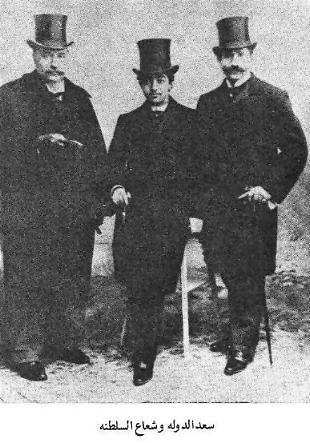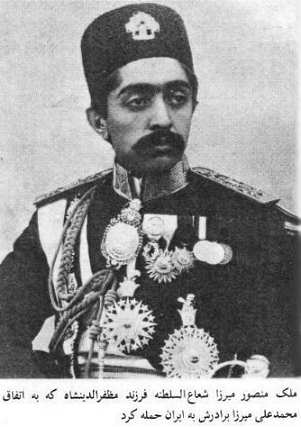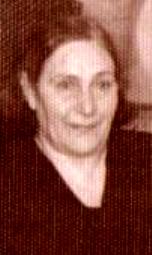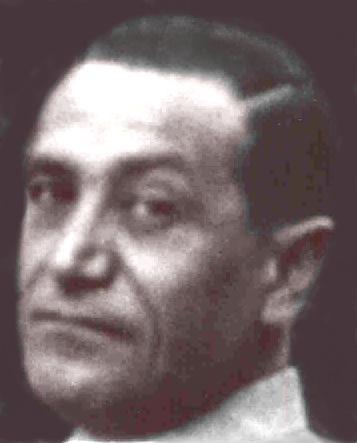The Story
Of Moazzam-el-Molk
Moazzam-el-Molk was from one of the biggest land owning
gentries of his time. Iran has always been a largely
agricultural country and until the 1960's it was a vast
feudal country. The land owning gentry were called
Khans or Khanates (plural) which presided over a very old
system of serfdom. This provided the base for much of
the wealth for the middle and upper classes in Iran prior to
modernisation of the country in the twentieth century.
By all accounts, Moazzam-el-Molk's family were super rich
owning much of the prime land in north west Iran. Yet
he gave all his share away under charitable trust to the
clergy. Such charitable acts by the rich in those days gave
the mullahs their financial strength similar to the strong
base enjoyed by the Church of England. To this day the
prime real estate in London is owned by a few rich land
owners, the Crown and the Church of England are two of
them. When in 1960's under pressure from President
Kennedy, Mohammad Reza Shah introduced a set of reforms,
chief amongst them was Land Reform as the Americans feared a
peasant revolution in Iran and potentially make the country
another Soviet satellite state. The impact on the
clergy's income was disastrous which caused an irreparable
rift between the religious leaders and the monarchy in Iran.
 Getting back to our ancestor, there are two
theories as to why he gave his land away. One story which may
be more myth than fact, has it that he misspent his youth and
later came to regret it. He was a very sentimental and
kind man. He housed and provided for all his
mistresses. Anyhow the story goes that in his old age
he became religious and as penance for his misspent youth
gave all his wealth away to the clergy. However Massoud
Gharajedaghi refutes the above and given the following account: Moazzam-el-Molk
returned to Teheran when Prince Regent joined his brother Mohammad Ali Shah's
Coup to roll back democracy in Iran. Moazzam-el-Molk was a conscientious man who
came under the influence of the clergy. He was made to
believe that he somehow shared some of the responsibility for
the Prince Regent's governorship of the Fars province (whereas his
inheritance was in another part of Iran and nothing to do with the
Prince Regent). The
Mullahs suggested to him that to atone for his sin or literally
wash his sins, he should dispose of his wealth for
charitable purposes which is what he did. The common
thread with both stories is his sentimentality which was
apparently a cause of much discord between husband and wife.
Getting back to our ancestor, there are two
theories as to why he gave his land away. One story which may
be more myth than fact, has it that he misspent his youth and
later came to regret it. He was a very sentimental and
kind man. He housed and provided for all his
mistresses. Anyhow the story goes that in his old age
he became religious and as penance for his misspent youth
gave all his wealth away to the clergy. However Massoud
Gharajedaghi refutes the above and given the following account: Moazzam-el-Molk
returned to Teheran when Prince Regent joined his brother Mohammad Ali Shah's
Coup to roll back democracy in Iran. Moazzam-el-Molk was a conscientious man who
came under the influence of the clergy. He was made to
believe that he somehow shared some of the responsibility for
the Prince Regent's governorship of the Fars province (whereas his
inheritance was in another part of Iran and nothing to do with the
Prince Regent). The
Mullahs suggested to him that to atone for his sin or literally
wash his sins, he should dispose of his wealth for
charitable purposes which is what he did. The common
thread with both stories is his sentimentality which was
apparently a cause of much discord between husband and wife.
 To understand the significance of the above, one
must know something of Shoa'-ol-Saltaneh. Prince Malek
Mansour Shoa'-ol-Saltaneh was the second son of Mozzafar-e-Din
Shah. His governorship of the Fars and southern
provinces resulted in rebellion because of his heavy handed
treatment of people and his greed. He later joined his
brother Mohammad Ali Mirza's efforts to roll back democracy in Iran. He was
part of what became to be called the Minor
Dictatorship when Mohammad Ali Mirza set himself against the
people. The parliament was bombarded by the Russian led Persian
Cossack Brigade
bringing the democratic process to a halt. Khanoum Joon Joon's brothers took
part in the fight to restore democracy in the military and political
arena (see the pages for Ebrahim and Moussa Hakimi). After
Mohammad Ali Mirza was deposed, Shoa-ol-Saltaneh joined him
in exile in Russia and took part in his brother failed
attempt to regain the throne. He and his brother landed
in Gilan with forces put together with the help of their
hosts, Russia.
To understand the significance of the above, one
must know something of Shoa'-ol-Saltaneh. Prince Malek
Mansour Shoa'-ol-Saltaneh was the second son of Mozzafar-e-Din
Shah. His governorship of the Fars and southern
provinces resulted in rebellion because of his heavy handed
treatment of people and his greed. He later joined his
brother Mohammad Ali Mirza's efforts to roll back democracy in Iran. He was
part of what became to be called the Minor
Dictatorship when Mohammad Ali Mirza set himself against the
people. The parliament was bombarded by the Russian led Persian
Cossack Brigade
bringing the democratic process to a halt. Khanoum Joon Joon's brothers took
part in the fight to restore democracy in the military and political
arena (see the pages for Ebrahim and Moussa Hakimi). After
Mohammad Ali Mirza was deposed, Shoa-ol-Saltaneh joined him
in exile in Russia and took part in his brother failed
attempt to regain the throne. He and his brother landed
in Gilan with forces put together with the help of their
hosts, Russia.
Moazzam-el-Molk chose the surname Hashemi while his relatives chose
other surnames such as Rabie'ian, Moghtadar and Sadeghi. But their children
took up their mother's family name.




